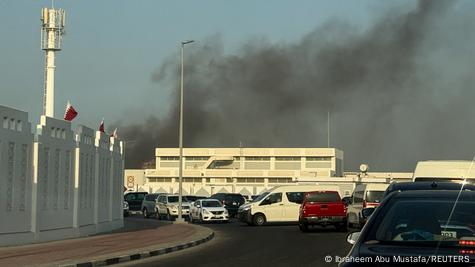Intensifying Geopolitical Tensions Following Israeli Airstrike in Qatar
In a dramatic escalation of conflict in the Middle East, Qatar has condemned a recent Israeli airstrike targeting leaders of Hamas in Doha, labeling the action as a “blatant violation” of international law. Israeli Prime Minister Benjamin Netanyahu, however, has defended the strike, asserting that it was “fully justified” as part of Israel’s ongoing efforts against Hamas.
Global Reactions and Emerging Pressures
The strike on Qatari soil has drawn considerable international scrutiny, heightening an already tense environment. Reports indicate that President Trump expressed his dissatisfaction with the operation amid growing calls for restraint on Israel’s part. The backdrop of this conflict is marked by Qatar’s role as a mediator in the indirect negotiations between Israel and Hamas, raising further questions about the implications of this military action on future diplomatic efforts.
Analysis of the Situation
Jeremy Bowen, a prominent analyst, remarked that this incident signals Netanyahu’s determination to maintain an aggressive stance against Hamas. He noted that striking at the leadership level indicates a broader strategy by Israel to confront Hamas on multiple fronts, ultimately diminishing hopes for a peaceful resolution.
Growing Domestic and Global Tensions
Simultaneously, other global concerns have surfaced. Poland reported incidents involving drone incursions into its airspace, described as “unprecedented violations.” The Polish military confirmed that its airspace had been repeatedly breached by unidentified drone-like objects.
Domestic Challenges in the US
On the home front, the United States faces its own set of challenges. Recent discussions surrounding alleged connections between Donald Trump and Jeffrey Epstein have resurfaced, particularly regarding a letter purportedly signed by Trump in tribute to Epstein. The White House categorically rejected claims of the letter’s authenticity.
Additionally, political tensions are rising in Turkey, where President Erdogan asserts that he is combating corruption, while critics accuse him of silencing dissent and undermining human rights. This internal strife coincides with broader global concerns regarding authoritarianism and governance.
International Movements and Protests
In Nepal, the political landscape has shifted dramatically following the resignation of Prime Minister KP Sharma Oli amid anti-corruption protests that have turned deadly, with reports of at least 22 fatalities in violent clashes. This upheaval reflects wider unrest and dissatisfaction with leadership in the region.
Key Developments: A Snapshot
| Event | Location | Comment |
|---|---|---|
| Israeli Airstrike on Hamas | Doha, Qatar | Condemned by Qatar as a violation of international law |
| Drone Incursions | Poland | Polish military reports repeated violations, uncertainty remains |
| Protests Against Corruption | Nepal | At least 22 reported deaths amid protests |
As the geopolitical landscape continues to shift, the repercussions of these events will likely resonate far beyond their immediate contexts, complicating diplomatic efforts and increasing global scrutiny on leadership decisions.

